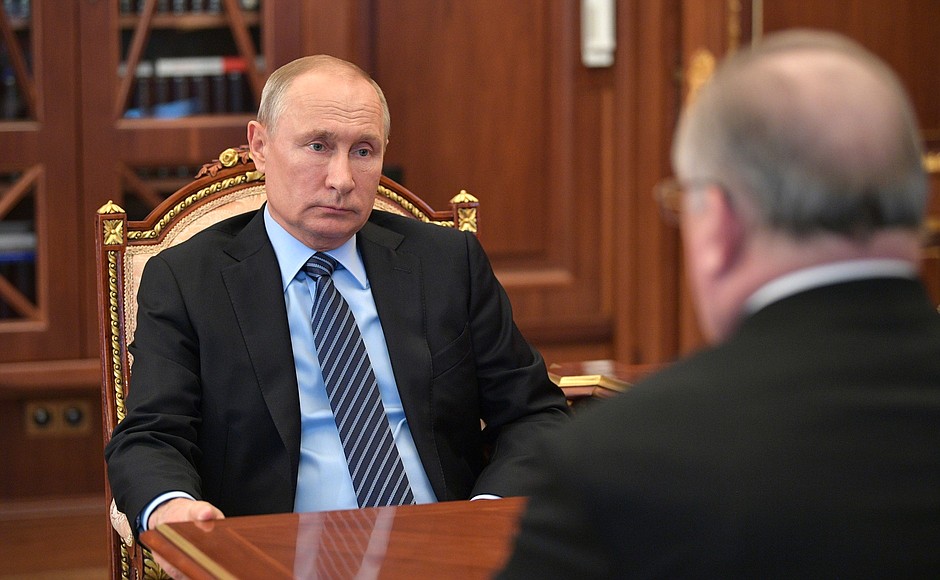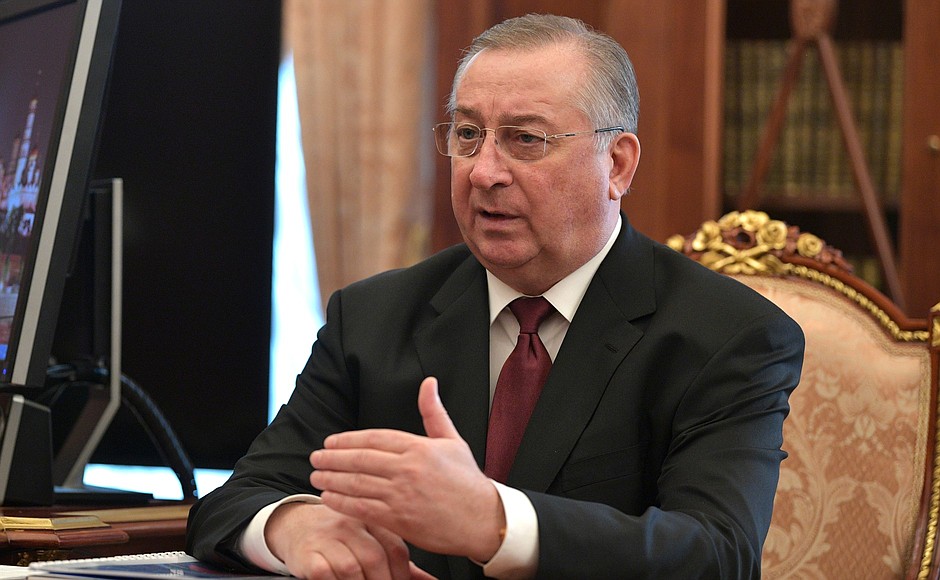President of Russia Vladimir Putin: Mr Tokarev, we had a meeting on the overall situation in the transport industry not that long ago, but we did not discuss pipelines at the time. However, pipelines are an essential part of Russia’s expansive transportation system and play a significant role in the national economy.
For this reason, I wanted to hear what you think about the situation within the company, especially since this is linked to hydrocarbon deliveries to the domestic market, as well as to export markets that are going through challenging times, as we know. This is the first topic I wanted to raise.
Second. Transneft’s investment plans have great importance for the national economy, since your company is one of the largest consumers for our industrial manufacturers. I would like to hear about the situation here.
Overall, what is the situation within the company, considering today’s challenging epidemiological situation? Go ahead, please.
President of Transneft Nikolai Tokarev: Mr President, the company improved all of its basic key manufacturing and economic indicators in 2019 compared to 2018, and had positive momentum in its performance. Our cargo turnover increased by 2.5 percent, and oil deliveries into the Transneft system were up 1.5 percent. Russia’s oil exports increased by 4 percent in 2019, defying all ill-spirited predictions to the contrary.
In addition, financial performance has also been quite positive. Revenue increased with Transneft reporting over 1 trillion rubles in revenue for the first time. Tax payments were 14 percent higher, and all the funding under the 270-billion-ruble investment programme was put to work. We also fulfilled all our obligations under loans and credit facilities, and are consistent in paying them out.
Overall, last year we completed a number of large strategic projects. We reached the targets set for the first and second phases of the East Siberia-Pacific Ocean (ESPO) pipeline. The capacity of the pipeline from Taishet to the Chinese border is 80 million tonnes, and the capacity of the pipeline from Skovorodino to Kozmino on the Pacific coast is currently 50 million tonnes. At the same time, we increased the capacity of the Kozmino oil port to 36 million tonnes. In other words, it is currently the most promising region for export; oil companies are eager to work on this Asia-Pacific market.
We have built 10 and modernised six oil pumping stations. We have created 1,100 new jobs in the region, in addition to the 9,500 jobs we had under the ESPO project.
We have also completed a large project to modernise the petroleum product pipeline system in the Moscow area, so that now all the consumers in the region have the necessary amounts of motor and aviation fuel. We completed the project quite rapidly by using modern technology plus automation and dispatcher systems. In a word, the Moscow area now has one of the best and most advanced systems.
We have commissioned the plant in Tatarstan, which has been built from scratch under the import substitution programme to produce anti-turbulence additives. It can satisfy the requirements of both Transneft and the consumers from the former Soviet republics. In fact, we are turning from importers to exporters and are entering the international market.
Overall, over the past 10 years Transneft has invested 2.5 trillion rubles into building new pipelines and overhauling and modernising the existing systems. We have built 19,000 kilometres of new oil and product pipelines and three ports. In the past three years, we have built three large plants under the import substitution programme – two in Chelyabinsk and one in Tatarstan, as well as expanding production at our pant in Tyumen.
Now these facilities fully meet Transneft’s requirements for main pumps, electrical drives and motors. Moreover, these products are needed not only in the oil industry but will now be supplied to shipbuilders as well. And wind farms will also be able to use our plant’s technology too.
Overall, as part of the import substitution programme over the past 10 years we introduced 25 product categories that used to be imported. Today, Transneft’s import substitution level has reached 96 percent, with products that simply cannot be manufactured in Russia accounting for the remaining 4 percent.
As for the social dimension, the company has 117,000 employees, and pays corporate pensions to 30,000 retirees. Company staff members get private medical insurance and generous employment benefits.
Turning to our 2020 plans, considering the pandemic and the OPEC deal, we are now working to include new stress factors into the budget so that we do not have to cut our investment programme. We planned to spend 257 billion on it. We hope that this will be the case, although revenue and freight turnover are expected to drop by about 10 percent, according to preliminary estimates. We have already submitted our proposals to the Government on how to prevent the cashflow from drying up and keep the investment programme unchanged. There are a number of proposals and a positive response on some of them. I think that we will be able to find acceptable solutions.
Vladimir Putin: This is very important. I would like to ask you to make this a priority.
Nikolai Tokarev: Transneft currently focuses on modernising, rebuilding and overhauling its existing infrastructure, since about 40 percent of the existing networks have reached the limits of their operational capacity. Mechanical and technological equipment, energy supplies and linear sections of oil pipelines need to be replaced. This is what we will focus on over the next five years, as approved by the Board of Directors. We hope that we will complete the review of our budget considering the existing stress factors, and will find the solutions we need.
Vladimir Putin: Good.
Nikolai Tokarev: As for the pandemic, we now have 23,000 people working from home. Within just a few days, we were able to transfer corporate communications online thanks to the company’s IT systems.
We have reserve teams on standby in the regions in case a state of emergency is declared in any of them. These teams include key employees, such as dispatchers, operators, and specialists for oil pump stations. We have this option ready, should the need arise.
We have 6,000 rotational workers. We decided to double the bonuses for them, increased the intervals between rotations, and also the rotational shift itself to three months. We had no other choice, and people understood and accepted these changes. We will do everything to make sure that this goes smoothly.
That is to say that the situation is under control, the response teams are operating on the ground and report to Moscow. I do not expect any unforeseen developments on this front.
Vladimir Putin: Good.
<…>

